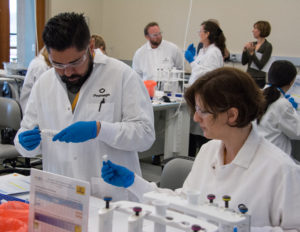When I was in grad school and pictured what a role in industry would look like, the first thing that came to my mind was a Research and Development (R&D) Scientist. My life as a grad student and as a postdoc revolved around benchwork, so that must be the case in industry too, right?
It really wasn’t until I started working at Promega that this image of a scientist in industry was completely turned upside down (in a good way). Here are some roles that a scientist can assume at Promega: Senior Scientist, Research Scientist, R&D Group Leader, Production Scientist, Technical Services Scientist, Product Manager, Strategic Marketing Manager, Client Support Specialist, Client Support Consultant, Clinical Technical Consultant, Field Support Scientist, Applications Scientist, Scientific Instructional Designer. The list can probably go on for a while, but it makes the point that there are a variety of interesting positions for scientists in the biotech industry.
Even my own position at Promega has exposed me to the variety of roles. I’m a member of the Scientific Applications and Training (SAT) group, which includes the Scientific Applications team (Applications Scientists) and the Scientific Training team (Scientific Instructional Designers). My job as a Scientific Instructional Designer is to design and implement training on our products to support our Sales group as well as our Technical Services Scientists. The main goal is to train the employees that interface with our customers so that they can offer advice about choosing products and integrating them into a lab’s workflow.
What does “design and implement training” really mean practically? We collaborate with scientists in Marketing and R&D to teach our employees about a product or group of products. We have several different types of training: online webcasts when new products are launched, online self-paced courses to learn more about a product group or a technique, in-person training on new products/instruments, and in-person training on groups of products that apply

to a specific technique or a certain field of research. My favorite training type is the in-person training, as it includes both classroom and wet-lab activities. I develop lab activities that include our products in experiments relevant to how our customers would actually use the products. That means that I get to collaborate with many of the R&D scientists in the company, learn about the products they develop, understand the questions that customers are asking, and then get creative! Once the lab activity is developed and the attendees are in the lab, the R&D scientist provides more information about the product, and we work together to help the attendees to complete the experiment. Then, the attendees work as teams to analyze their data and present their findings to the group. It’s really rewarding to see them present their data and gain confidence in talking about the technical aspects of our products.
After each in-person training, we hear from attendees about the value of what they learned and how it impacts their relationship with customers. Hands-on experience with the products and analyzing data from the lab activities helps our employees to relate to customers and offer advice from their own experience. Danka Vuga, one of our Client Support Consultants, has attended several in-person trainings recently. She believes that the trainings allow you to put yourself in customers’ shoes, and they give you the comfort and confidence to learn about their goals and how to help. The R&D Scientists and Applications Scientists that are integral to developing and delivering the training also find value in our programs. Spencer Hermanson is a Research Scientist that recently presented at one of our in-person trainings. He commented that he had worked at several different biotech companies during his R&D career and felt like his “hard work just resulted in a SKU # on a website” without the opportunity to further support or enable the sales force to understand the product. He sees training at Promega as a unique forum where he can discuss what he has developed with those in the field that are assisting customers.
Our training program is global in order to support our 17 worldwide branches. We have a lab dedicated to training at our Madison, WI corporate location, where we have about 5-7 in-person trainings on different technologies per year. We also manage about 40-50 product-specific webcasts per year, in addition to developing various new self-paced online training courses. We also have two Applications and Training labs, one in Singapore and the other in France, which also conduct in-person trainings. Our Scientific Applications team in Madison and the scientists in these labs teach training courses in addition to their Applications function. As Applications Scientists, they perform experiments to test new uses of our products; many of the projects come from customer requests. They also visit customer labs to help with troubleshooting or getting started with a product for applications specific to the customer.
My time at Promega has been crucial to shaping my view of the diverse opportunities for scientists in the biotech industry. This variety of roles comes at a time when many recently trained life scientists are searching for how they can use their skills outside of academia. It’s a perfect time to take a renewed look at being a scientist in industry!
